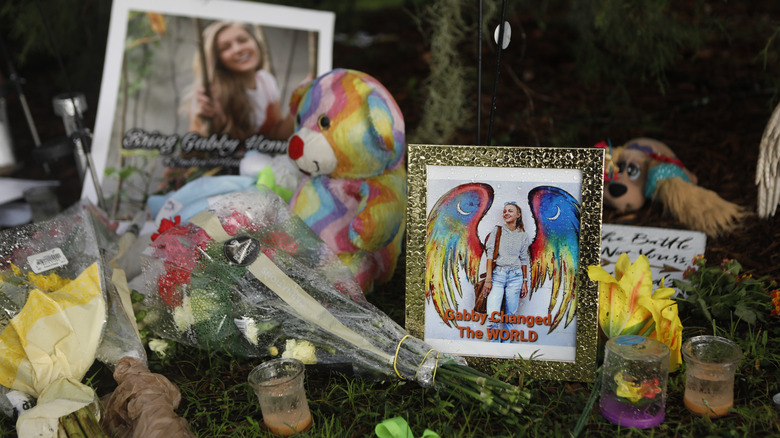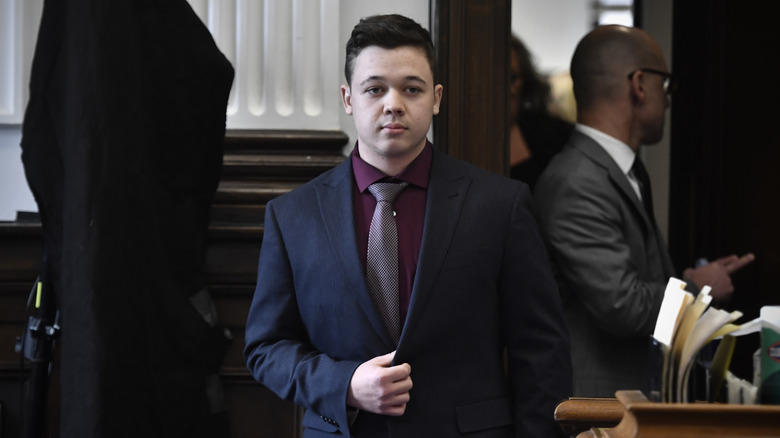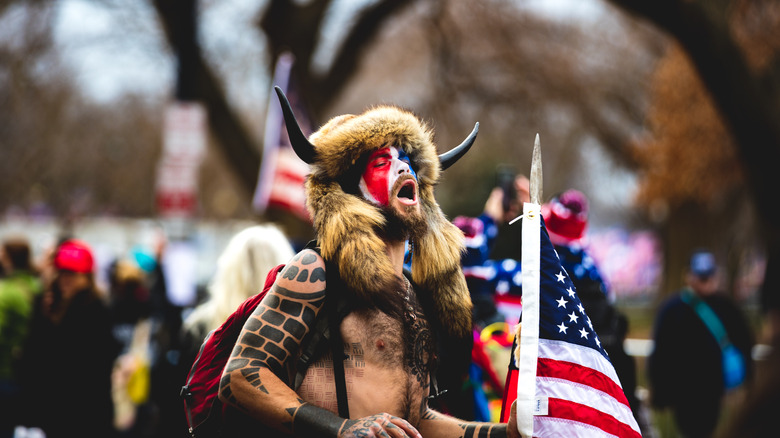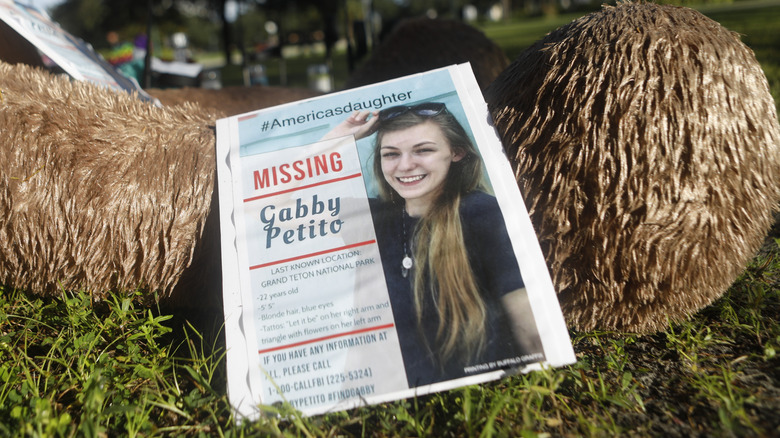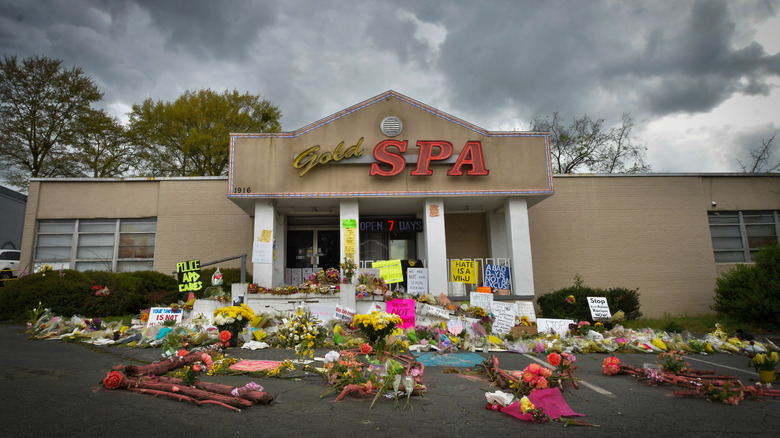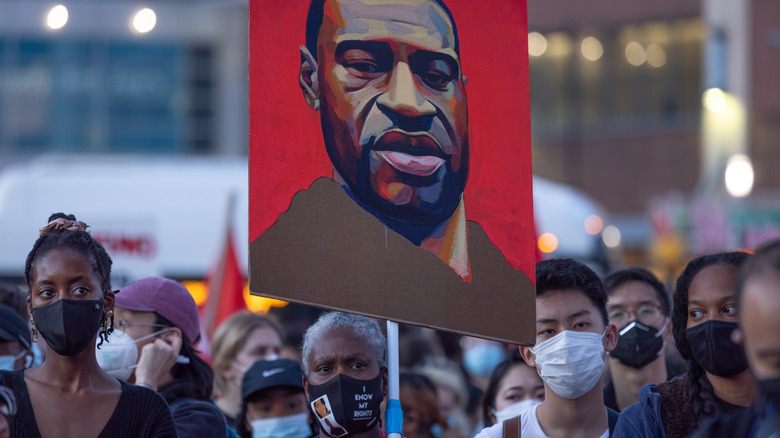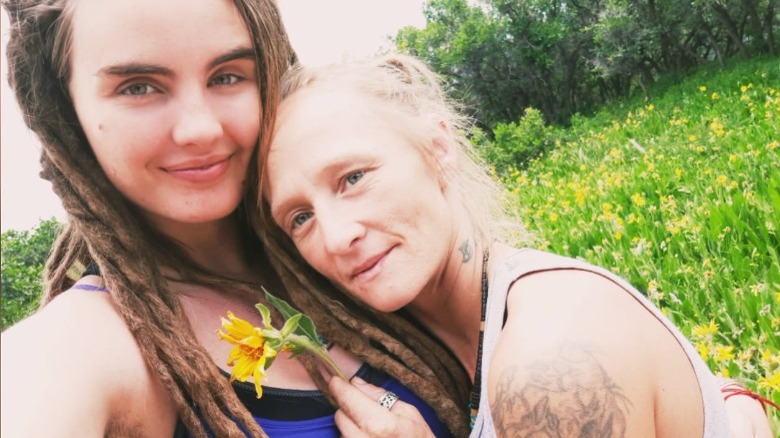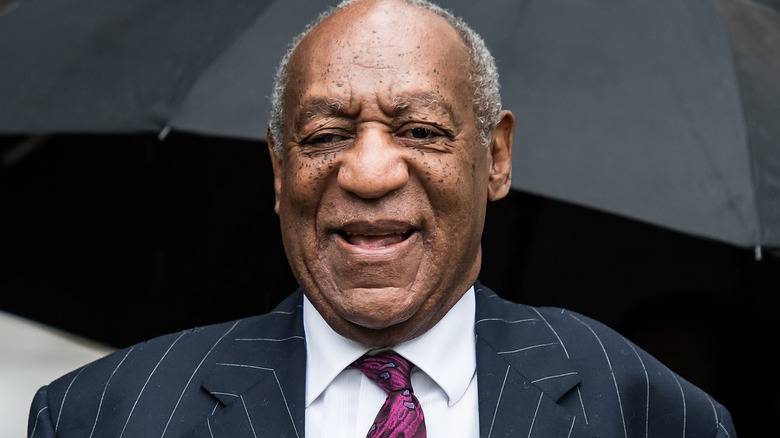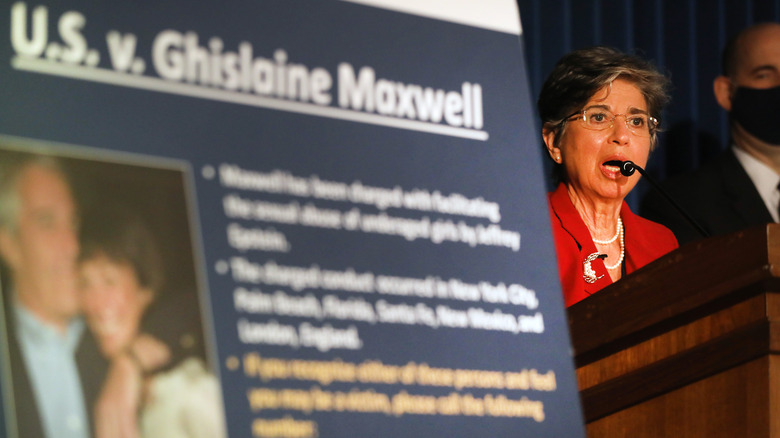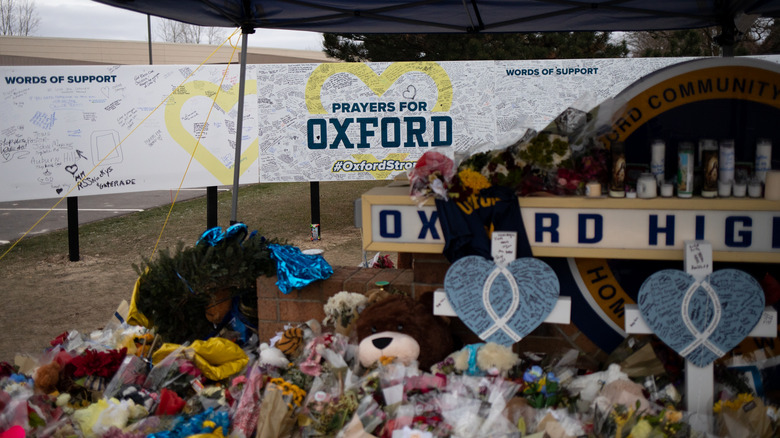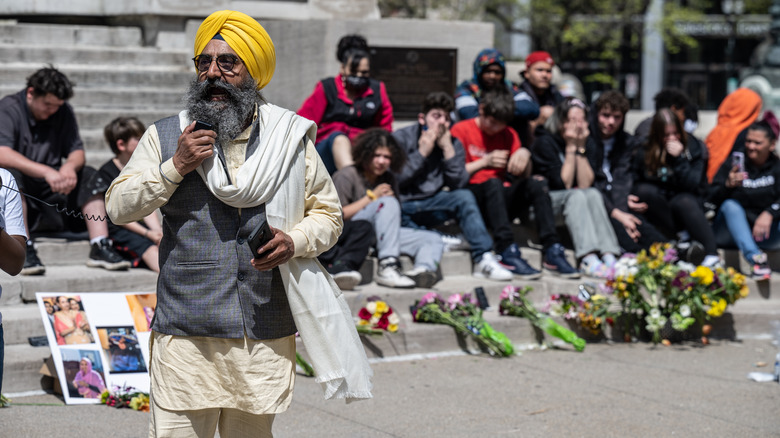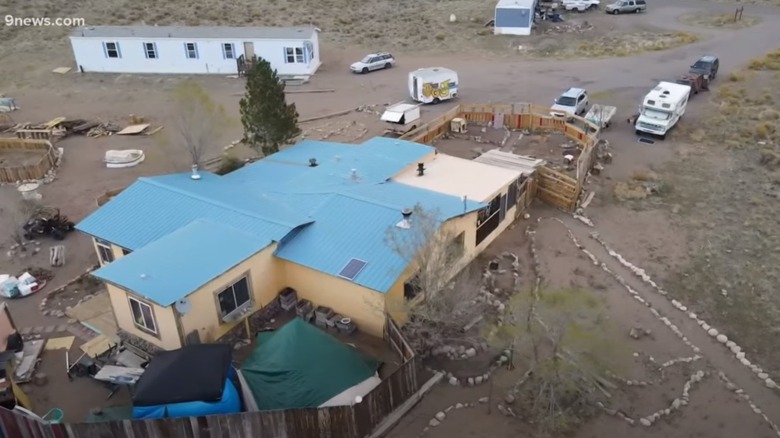The Biggest True Crime Stories Of 2021
It's no secret that the decade that started with 2020 quickly shaped up to be pretty dire stuff, and that continued into 2021. The whole thing was essentially just a big ol' nightmare, and whatever current events you might want to think about, well, there was a good chance it was going to be awful.
When the nation's difficulties continued as the months wore on, it wasn't entirely unprecedented. Early headlines had, after all, been dominated by a shocking attack on the Capitol building. It very quickly became clear that hopes and dreams of a better 2021 had been laughed at by whatever divine powers control these sorts of things.
The good news is that violent crime — like murder — is lower than it was in the 1990s, but the bad news is that according to The New York Times, the murder rate rose by a whopping 30% in 2020. The following year showed a slight decrease, but according to studies cited by the Council on Criminal Justice, continued high-crime rates suggest the COVID pandemic had a long-lasting impact on the nation's criminal and social landscape. Crime across the board was on the rise, and the sheer everyday-ness of violent crime means that when stories dominate the headlines for weeks, they're shocking stuff.
So, let's take a look at the biggest true crime stories of the year, and remember how weird it really was.
Kyle Rittenhouse
Kyle Rittenhouse's trial came to an end in 2021 — for the moment — but the whole thing started the previous year. That, says the BBC, is when he left his Illinois home to go to Kenosha, Wisconsin. It was August, and in the wake of another police officer shooting another Black man in the back, locals were rioting. The 17-year-old Rittenhouse ended up front and center, armed with a semi-automatic rifle and a desire to, he said, "protect people."
The first man he shot and killed was Joseph Rosenbaum, an unarmed individual who had reportedly tried to disarm Rittenhouse. The second man shot was Anthony Huber, who also tried to disarm the teen. Then, Gaige Grosskreutz was shot: When he appeared at Rittenhouse's trial, he testified that yes he had been armed, but he'd only been trying to stop the shooting.
That trial dominated headlines in 2021, raising questions not just about the legalities of vigilante justice, but of gun ownership, open carry laws, and when is self defense really self defense... and when is it not.
In November, The New York Times reported that it took the jury 26 hours of deliberations to find Rittenhouse not guilty on all charges. The verdict was widely condemned, and the problem was summed up by California governor Gavin Newsom like this: "You can break the law, carry around weapons built for a military, shoot and kill people, and get away with it."
The Capitol riots
There's no denying that 2020 was a long, hard year. What got many people through it was looking forward to 2021 and hoping that it would be better. But 2021 had other ideas — and things kicked off with something that seemed impossible: armed rioters storming the Capitol building.
The world watched with horror as rioters — including members of far-right organizations like the Proud Boys — first marched on the Capitol, and then just kept right on going. Even as President Donald Trump spoke to the crowd, saying (via the BBC) things like, "We will never give up, we will never concede," and "We fight. We fight like hell and if you don't fight like hell, you're not going to have a country anymore," crowds shoved past police blockades and into the in-session Capitol.
Even as Vice President Mike Pence was evacuated, the crowd chanted and called for his hanging. Later — at around 6 p.m. — Trump tweeted, lauding the "great patriots" in the Capitol, on the heels of the confirmation of the death of Ashli Babbit.
It took 100 days for the first guilty plea — on charges of "obstruction of an official proceeding and entering a restricted building with a dangerous weapon" — to be entered, says the BBC. Over the course of the seven months following the riot, CBS News reported that 570 people were arrested, and the Department of Justice was undertaking "the most complex investigation ever prosecuted."
Gabby Petito's disappearance
For months, the headlines of major news outlets in the United States were filled with daily updates on first the disappearance of 22-year-old Gabby Petito, and then, of the fate of her boyfriend, Brian Laundrie.
The saga started in June, says CNN, when the pair set off on a cross-country trip. All seemed normal until the end of August, when Petito's formerly regular communication with her parents suddenly stopped. She and Laundrie were in Utah at the time, and questions got more and more serious when reports of domestic abuse started swirling, and police bodycam footage of the couple was released. Laundrie returned to Florida without her, and when Petito's parents started doubting it was her who sent what would be her final texts, the search for her started in earnest.
Petito was officially reported as missing on September 11, and on September 19, news outlets were reporting that remains likely to be hers had been discovered. A massive manhunt for Laundrie followed, and it was more than a month later — on October 21 — that the FBI confirmed "skeletal remains" discovered in Florida had been positively identified as his.
While a seemingly infinite number of armchair detectives followed the case from the comfort of their own homes, others focused on another problem it highlighted. CNN reported that the extensive coverage illustrated the "missing white woman syndrome," which is the tendency of the media to focus on specific types of victims, while missing minorities are often overlooked.
The exoneration of Anthony Broadwater
In 1981, 18-year-old Alice Sebold was attacked and assaulted while walking home one night. The following year, Anthony Broadwater was put on trial, convicted, and sent to prison.
Sebold went on to write a memoir about the incident: "Lucky" kicked off her literary career, says The Guardian, and she went on to write "The Lovely Bones." There was a massive problem, though, and when producer Timothy Mucciante started looking into the real-life events of "Lucky" in preparation for giving the book a movie treatment, he found there were so many questions about the arrest and the conviction that he couldn't continue working on the project.
Mucciante was so convinced that something wasn't right that he hired a private investigator, and in November of 2021, The New York Times reported that the evidence gathered by the investigator had kicked off a review of Broadwater's case and conviction. After serving 16 years in prison and being registered as a sex offender — all while maintaining his innocence — he was exonerated.
Sebold has since apologized, saying (via The Guardian), "I will continue to struggle with the role that I unwittingly played within a system that sent an innocent man to jail." Shortly afterwards, it was announced that her publisher would be pulling her memoir. Broadwater has responded to the apology, saying that he was grateful for the apology, and hoped "this will help me in my process to come to peace with what happened."
Atlanta spa shootings
The COVID pandemic brought a lot of things with it, and for Asian Americans, that included the fear of racially motivated violence. In October 2021, NPR reported that one in four Asian Americans were living in fear that they or their loved ones would be the target or victim of a hate crime. Stories of racially motivated attacks dominated headlines, and perhaps no crime demonstrated how real this fear was more than the Atlanta spa shootings.
According to The New York Times, it was in March that Robert Aaron Long was arrested and indicted in connection with a series of shootings at three separate massage parlors. Eight people were killed, with six being women of Asian descent.
While prosecutors were originally not only pushing for the death penalty but also to have the shootings labeled as a hate crime, the Los Angeles Times reported in July that while he had been convicted of the murders, it was still ruled to be not a hate crime.
They also said it wasn't entirely surprising, adding some awful statistics — including the fact that between 2005 and 2019, only 17% of reported hate crimes were investigated by the Department of Justice. Everything — from the shooting spree itself to Long's prosecution and the refusal to label the killings as a hate crime — threw a bright light on another section of America's racial divide.
The Derek Chauvin verdict
Few incidents have highlighted the U.S.'s 21st-century problems with racial injustice and equality like the death of George Floyd. When Floyd died under the knee of Minneapolis police officer Derek Chauvin in 2020, it sparked riots across the country as people demanded not just justice for Floyd, but widespread change.
Needless to say, all eyes were watching when Chauvin went on trial for Floyd's murder, and in June, AP News announced that at the end of a three-week-long trial, Chauvin had been found guilty and sentenced to 22.5 years in prison. That was much longer than the state-recommended guidelines, which suggested 12.5 years for the crimes that he was convicted of. Judge Peter Cahill declared the longer sentence was necessary and cited the "abuse of a position of trust and authority, and also the particular cruelty" of the case.
The sentence was also the longest a Minnesota police officer had ever been given, but it wasn't enough for many in the crowd that gathered outside the courthouse. Floyd family attorney Ben Crump summed it up like this: "Real justice in America will be Black men and Black women and people of color who will not have to fear being killed by the police just because of the color of their skin. That would be real justice."
Chauvin could be up for parole in around 15 years.
Kylen Schulte and Crystal Turner
CNN says that one of the last confirmed sightings of Gabby Petito — before the recovery of her remains — was in Moab, Utah. It was on August 12 that police intervened in a domestic dispute between Petito and Brian Laundrie, and strangely, her disappearance had the strange side effect of shining the light on another awful crime: the double murder of Kylen Schulte and Crystal Turner.
Schulte and Turner were discovered on August 18, where they had been killed at their campsite not far from Moab (via the Independent). While it was briefly speculated (via ABC News) that there was a connection between Petito's disappearance and the couple's murder, that theory did quickly fall by the wayside. Still, the close proximity of the murder and Petito's disappearance put the brutal murder in national headlines.
In September, the Grand County Sheriff's Office issued another request for anyone who had seen Schulte and Turner to come forward, in hopes of learning more about the man that had been harassing them prior to their deaths. Acquaintances say (via People) both women had mentioned a "creepy" man hanging around their campsite, remaining close enough to make them incredibly uncomfortable. They even went as far as to say that if they turned up dead, that the unidentified man was the murderer.
Appeals for any information — particularly regarding the man or what kind of vehicle he was driving — have continued.
Bill Cosby
After spending decades being the father figure that everyone looked up to — and spokesperson for Jell-O Pudding Pops — Bill Cosby was arrested in 2015, then was put on trial for the 2004 drugging and sexual assault of Temple University employee Andrea Constand. More than 50 women ultimately came forward with allegations of sexual misconduct, and he was convicted and sentenced in 2018.
Then, in 2021, he was back in the headlines — and this time, he was being released as a free man.
According to The New York Times, the court overturned the convictions because in 2005, the Montgomery County district attorney promised Cosby that he wasn't going to be charged at all, and in 2006, the case with Constand was settled for $3.38 million. His admission in the deposition — that he had on other occasions given women drugs, then proceeded to have sexual relations with them — was used as evidence in his trial, and then, it was used as grounds for overturning the guilty verdict.
The Times stressed that Cosby's release in no way meant that he didn't commit the crimes he was accused of, it simply meant that he couldn't be prosecuted for them. Prosecutors then elevated the case to the Supreme Court and asked for a review (via CBS), amid widespread protests and calls for justice.
Ghislaine Maxwell
As detailed by The New York Times, in 2019, Jeffrey Epstein was arrested on charges including sex trafficking and exploitation of minors. Just 35 days after his arrest, he died of an apparent suicide while in prison. That meant that he never stood trial for some truly horrible crimes, and in 2021, the entire thing was back in the news again. This time, it was Ghislaine Maxwell on trial. While her defense attorneys claimed that she was being turned into a scapegoat, the prosecution was arguing that everything Epstein did, he did with her help.
Maxwell's trial — on a slew of charges that included conspiracy and sex trafficking of a minor — started in late 2021, and the world watched as prosecutors described her (via the New York Times) as his "No. 2," while she was alternately called "one of the assistants."
Determining her culpability and, ultimately, her relationship with Epstein became one of the prime concerns of both the defense and the prosecution. As the trial went on, the jury heard witnesses — many identified by pseudonyms like "Jane" and "Kate" to protect their privacy — claim (via The Guardian) that Maxwell had approached them with offers to introduce them to the man she called "her boyfriend" and "a philanthropist." By the time they knew what they were really getting involved with, it was too late.
Maxwell has pleaded not guilty to all charges.
The Oxford High School shooting
School shootings are tragically nothing new, and in late 2021, The New York Times was reporting on a shooting in Michigan that came after a lull: With schools closed and students learning from home during the COVID pandemic, there hadn't been as many shootings. With schools back in session, though, the shooters were back, too.
It was 15-year-old Ethan Crumbley who was arrested for shooting 11 and killing four at Michigan's Oxford High School on November 30. In spite of his age, he was charged with a slew of offenses that included first-degree murder, and it could add up to a life sentence. Again, school shootings are tragically almost commonplace, and what made this one different was that Crumbley's parents were being charged, too.
On the morning of the shooting, school officials had met with his parents to discuss disturbing behavior, including shopping for ammunition and drawing pictures of shootings. Parents James and Jennifer Crumbley opted to have their son remain in school, and although authorities said they believed he had planned the shooting alone, James Crumbley's purchase of the handgun used — and Jennifer Crumbley's social media posts that described the gun as Ethan's "Christmas present" — were enough to get them charged with involuntary manslaughter.
The case could set a major precedent in future shootings.
Indianapolis FedEx shooting
Yet another mass shooting grabbed headlines in April of 2021: This one took place at a FedEx facility in Indianapolis, and according to ABC News, it was 19-year-old ex-employee Brandon Hole who had driven to the facility and randomly started shooting in an attack that left eight people dead and seven others injured.
It wasn't the first time he'd come to the attention of law enforcement. In 2020, his mother had gotten in touch with officials to report that she feared her son "might try to commit 'suicide by cop,'" according to the local FBI office. A gun was removed from his home at the time, and he was transferred to the custody of the Indianapolis Metropolitan Police Department. According to NPR, massive questions were raised about why he had been able to legally purchase the guns he used in the FedEx shooting, in spite of the concerns his family had previously shared with law enforcement.
Hole was later found dead from an apparently self-inflicted gunshot wound, and according to Indianapolis authorities, it was coincidence that four of the people killed were members of the Sikh community. A hate or racial bias was ruled out as motive — an opinion that not everyone was fond of — and it was believed his motive had been solely to "demonstrate his masculinity and capability."
Colonial Pipeline ransomware attack
It's not often that a true crime story touches the lives of thousands of people, but in 2021, one did — and that was the hacking of the Colonial Pipeline.
According to The New York Times, Colonial Pipeline found themselves the target of a ransomware attack, during which hackers got into their computer systems and encrypted their own data. The only way to get the encryption key was to pay the ransom — which was in this case around $5 million in Bitcoin — and in the meantime, it led to the complete shutdown of around 5,500 miles of oil pipeline.
Not only was it the first time that the pipeline had ever been shut down, but it disrupted a huge amount of East Coast business. Colonial is the company that supplies about half of the fuel to the Eastern seaboard, and it triggered a slew of consequences, from lines of panic-buyers to skyrocketing gas prices and major shortages.
It later came out (via Reuters) that the entire thing happened because of a single stolen password and a hack credited to a group called DarkSide. The pipeline was down for several days, and it took some time to get it back up and running — after they paid the ransom. Those investigating the incident said there was the potential for it to happen again. As Senator Gary Peters explained, "Make no mistake: if we do not step up our cyber security readiness, the consequences will be severe."
Love Has Won
Sometimes, stories capture headlines because they're unthinkably horrible — and sometimes, it's because they're just beyond bizarre. The latter is the case of a religious group called Love Has Won, and in April of 2021, they definitely made headlines.
According to the Independent, they first came to the attention of law enforcement when they were notified that the group had been traveling with the long-dead corpse of a woman identified as their leader, Amy Carlson. When they searched the group's Colorado residence, they found Carlson. She had, indeed, been dead for at least a few weeks and had been wrapped in a sleeping bag, then decorated with lights, glitter, and essential oils.
She was, at the time, being worshipped by the group, who thought that she was 19 billion years old, the mother of everything in creation, had been reincarnated 534 times (and had lived as Jesus, Cleopatra, and Marilyn Monroe), and would eventually lead the faithful to the next — and better — dimension.
Seven people were arrested on the scene, charged with the abuse of a corpse and child abuse, as there were two minors also living in the house with the body. There were also a number of other abuse allegations, as videos showing apparent child and animal abuse surfaced during the investigation. By September, CBS Denver was reporting that all charges had been dropped, and the group has since splintered.
